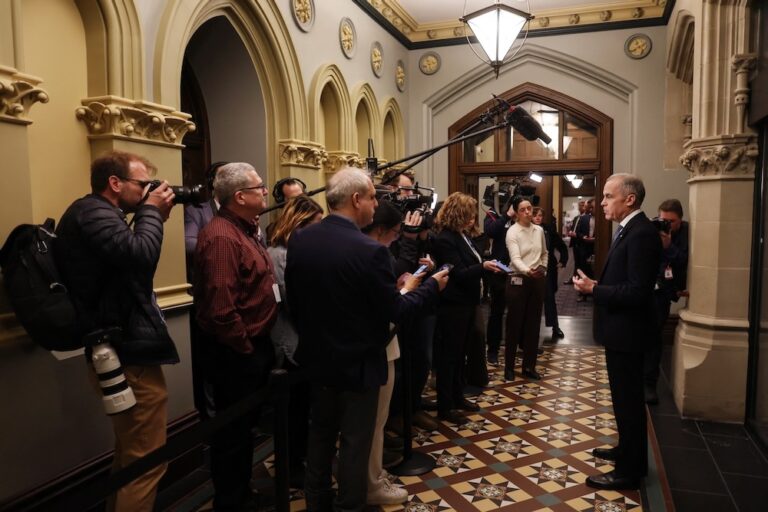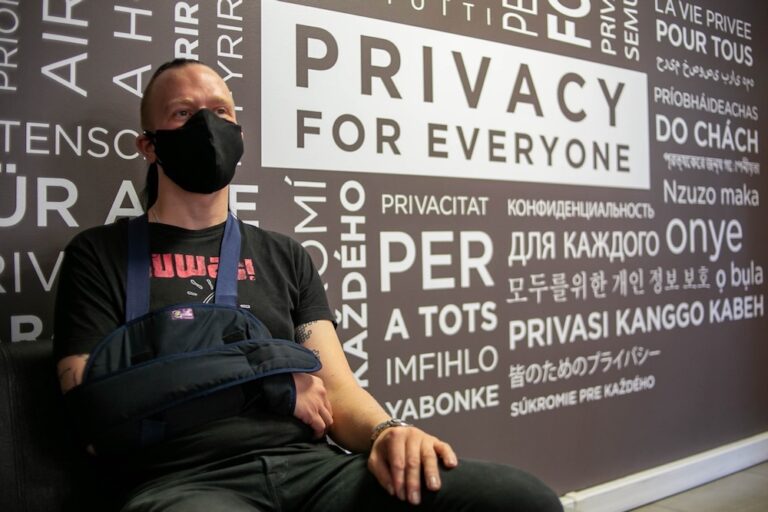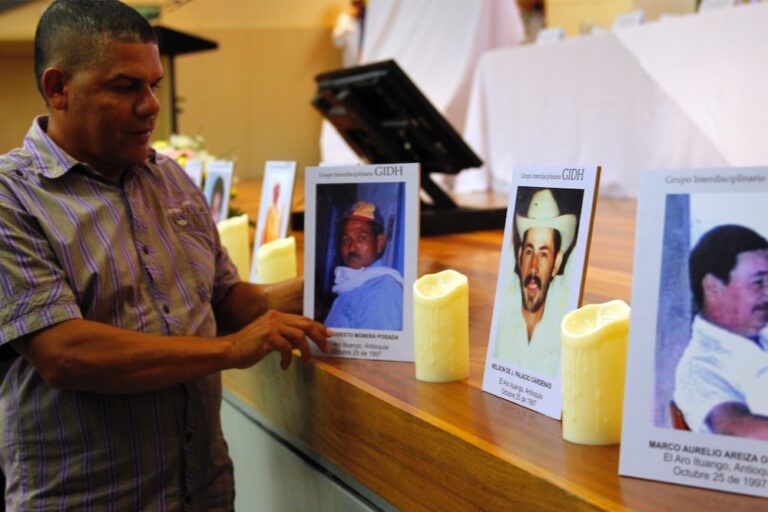March in the Americas: A free expression round-up produced by IFEX's Regional Editor Laura Vidal, based on IFEX member reports and news from the region.
A new fund in Colombia aims to support women journalists affected by gender-based violence as part of the reparations the state owes to Jineth Bedoya, while CPJ and Amnesty International highlight the failings of the Federal Protection Mechanism in Mexico, one of the most dangerous countries to work as a journalist. In Uruguay, an official investigation into a journalist and his sources raises alarms; and press workers in Haiti face unprecedented threats and challenges.
Improving the safety of women journalists in Colombia
On 7 March, the day before International Women’s Day, Colombia’s Chamber of Representatives passed the bill to establish the fund No Es Hora De Callar (“This is not the time to be silent”). This initiative, aimed at prevention, the protection of, and assistance to women journalists who are victims of gender-based violence, is part of the reparatory measures ordered by the Inter-American Court of Human Rights (IACHR) in the case of Jineth Bedoya.
Bedoya, an award-winning investigative journalist and advocate for women victims of violence in Colombia, became a symbol of resilience and the fight for justice after surviving abduction, torture, and sexual assault by paramilitary groups in 2000. Her ordeal was meant as a “message to the press,” highlighting the dangers women journalists face in the line of duty.
The historic IACHR ruling in 2021 held the State of Colombia accountable for multiple violations of Bedoya’s rights, and mandated comprehensive reparations, including policy reforms and the establishment of programs to protect women journalists.
The “No Es Hora De Callar” Fund, to be managed by the Ministry of Equality and Equity and regulated by the national government, involves participation from Jineth Bedoya herself and IFEX member the Foundation for Press Freedom (FLIP). With an annual budget of $500,000, the fund aims to finance national, departmental, and municipal programs to prevent, protect, and assist female journalists facing violence and to safeguard those under special risk in their professional capacity.
It is a welcome development; however, as Angela Caro, who has worked closely with Bedoya and is FLIP’s Legal Coordinator, points out, many other reparative measures have not yet taken place.
“This significant step forward underscores the Colombian State’s obligation to respond to the rest of the reparations, which have found a notable set of challenges and have been characterized by slow and vague responses.”
Mexico: The Federal Protection Mechanism fails the test, again
In a concerning evaluation of Mexico’s Federal Mechanism for the Protection of Human Rights Defenders and Journalists, a joint report by the Committee to Protect Journalists (CPJ) and Amnesty International questions the efficacy of protective measures currently in place.
Born from a dire need to safeguard those at the forefront of advocating for human rights and journalistic freedom, the Mechanism, operational since November 2012 and overseen by the Undersecretary for Human Rights within the Secretariat of the Interior (SEGOB), was designed to foster collaboration between federal and state authorities. Its goal: to urgently and preventively ensure the “life, integrity, liberty, and security” of individuals endangered due to their activism or journalistic endeavours. The reality, however, is very different.
Others have also highlighted the serious limitations of the mechanism, including local media and organisations, as well as the Inter American Press Association (IAPA), the UN Human Rights Office, and the Inter-American Commission on Human Rights (IACHR). ARTICLE 19 Mexico and Central America has not only pointed out how those working in the Mechanism fail to assist the people they’re supposed to serve; it has also monitored the cases of journalists that continued suffering from violence, or were assassinated in spite of being part of the Mechanism.
A significant criticism is that the Mechanism comes into play only after threats or attacks have occurred, rather than preventing them. In some cases, it has failed to protect journalists even after their calls for help. This was sharply underscored by the tragic murder of reporter Rubén Pat Cauich in July 2018 in Playa del Carmen, Quintana Roo, just two months after his enrolment in the program. Despite prior reports of threats and the earlier killing of his colleague José Guadalupe Chan Dzib, the Mechanism’s response – limited to a panic button without the provision of bodyguards – proved fatally insufficient. His case points to a broader issue: sluggish responses to imminent threats, coupled with insufficient resources.
While the joint research by Amnesty International and CPJ acknowledges that the Mechanism has a crucial role to play in protecting journalists, it exposes significant gaps in its operation and effectiveness. In a country where 88 journalists and media workers were killed since the Mechanism’s inception in 2012. This raises alarms, especially as Mexico approaches its presidential elections, when risks to journalists tend to soar.
Haiti: Media affected by worsening crisis
Haiti’s landscape continues to be marred by an evolving tragedy of political, humanitarian, and security crises. The assassination of President Jovenel Moïse in 2021 intensified the nation’s constitutional turmoil. Since then it has been wracked by economic chaos and little functioning political control. Gangs, although not officially part of political dialogues or negotiations, increasingly steer the country’s fate, exerting their influence with a tightening grip that challenges the state’s authority. Human Rights Watch (HRW) reports that from January to mid-March 2024, criminal factions claimed the lives of nearly 1,500 individuals uninvolved in the violence, and injured an additional 800.
Against this backdrop of chaos, Haiti’s media sector faces a dire threat to its financial sustainability. The absence of advertising and sales has led to journalists and media workers going unpaid or losing their jobs entirely, raising fears that only those media outlets with undisclosed financing might continue to narrate the essential stories of the day. In parallel, little is known about the condition of media houses outside of the capital and major cities.
The year 2023 saw the murder of three journalists, with another surviving a shooting outside his home, as documented by the IAPA. Furthermore, there were six kidnappings of media personnel, at least three instances of police brutality against journalists covering protests, and the torching of radio station Antarctique 96.1 FM by gang members in the northern part of the country.
On 21 March of this year, Nerval Pierre Viliat, a sports journalist with Echonews Sport, was killed when he was struck by a stray bullet during a shootout between police and gang members in the capital’s Delmas 19 district.
Harvey Panka, president of IFEX member the Association of Caribbean Media Workers (ACM), underscores the peril faced by journalistically independent media in Haiti, which are few and far between. ACM partners with independent media personnel on the ground; they paint a grim picture of the situation, and one that shows no sign of improving. Panka warns of what can happen when media workers are under constant, tremendous pressure, forced to work clandestinely if at all, in a constant state of fear for their lives, and without income:
“The undermining of the viability of journalistically independent media – and there are but a few in Haiti – can eventually lead us into even more dangerous terrain.”
Uruguay: Abuse of state power threatens press freedom
In Uruguay, an investigation into a journalist by the Ministry of the Interior has raised alarms about press freedom in one of the most stable democracies in Latin America. The probe sought detailed information about Eduardo Preve’s journalistic sources, particularly regarding his coverage of “El Guardián,” a surveillance device, and other police-related issues.
IFEX member the Center for Archives and Access to Public Information (Cainfo) has expressed concerns over the implications of such investigations. Highlighting the case’s extreme seriousness, Cainfo points out that using state intelligence to unveil journalists’ sources not only constitutes an abuse of state power but also has a chilling effect on potential sources privy to matters of public interest and on the journalists who report on them.
Moreover, the investigation included access to Preve’s record in the Public Security Management System, inquiries into potential informants, and scrutiny of calls made and received on his mobile device. In his segment on the radio program Nada que perder (“Nothing to lose”, available on YouTube) Preve expressed his astonishment at the investigation’s breadth, as it disturbingly included personal information like his children’s addresses and personal photographs.
In brief
Venezuela’s broadcasting blackout: On 4 March, Venezuelan subscription TV providers removed DW Español from their channels, following the German media outlet’s publication of a video on the social platform X, which delved into alleged corruption tied to the government.
“Standing Up to Censorship”: ARTICLE 19’s recent report analyses the state of freedom of expression in Cuba in 2023, including related rights such as the right to protest. A look at recent events show little change: “On 17 March, hundreds took to the streets across several Cuban provinces, peacefully demanding “electricity, food, and freedom.” The demonstrations were met with arrests and a pronounced military presence.



